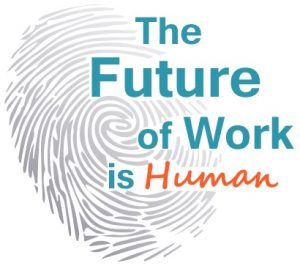
What do you want to be when you grow up? Children must roll their eyes at the question, given today’s increasingly flexible workplace. So what career revolution awaits them in the mid 21
st century? A quick search with a title such as '
the future of work' will unearth endless predictions, ranging from ones in which everyone will be gainfully occupied, through to the post-work societies in which AI will have supplanted every possible profession. So who is 'correct'?
Here's a reality for you. Predicting the future of work in the 2040s is about as possible as predicting the share market around that time. Good luck with that. So if we can't easily predict it, then how are we ever going to help our kids prepare for whatever is up ahead? Here are a few perspectives from my latest book
The Next Generation that might help.
- The one-job-for-life is declining. Most of our children will do many forms of work during their lifetime. This is good news for most under-20s, who generally recoil from the thought of remaining in a single work position for forty or more years. They have watched many of their parents endure long work hours in an unloved job, and the prospect does not interest them in the least. They want work to be an inspiration and a core component of a quality life. My niece Kate, now 33, has already worked in 11 jobs since leaving university. She’s smart, sassy and an excellent senior HR advisor. Her premise? When an organisation has fully benefited from your skills, and you have learned as much as you can from being there, it’s time to move on. Her husband Owen, an engineer, has held six jobs over the same time period.
- We can no longer separate work from life. It’s not a work–life balance we need, given the present imbalances in which work overwhelms life. What we need is a Work Plus Life experience in which each part is enjoyed in association with the other. Gen Ys and Gen Zs are already making choices that reflect this Work Plus Life. US gerontologist Ken Dychtwald, who generated the expression Age Wave, suggests that many of today’s under-30s already live in flexible seven-year work cycles, rather than a linear one-job, 45-year pattern. For six and a half years, they learn and earn in a specific profession, and for six months they ‘retire’ to pursue a lifetime ambition. This might involve the study of tango in Argentina or the support of orang-utans in Borneo. Upon their return, they will often enter an entirely different profession... and then continue to maintain this pattern until they are 95 years old.
- Although we need to be careful about extrapolating into the future, based upon past events, trends may provide a reasonable indicator of the near future of work. For example, analyses of American workers through the first years of the 21st century show that most of the jobs growth has occurred in what is called interaction work. This is when we require the highest level of human-to-human interface, such as with doctors and teachers. In Humans Are Underrated, Geoff Colvin writes that those types of jobs increased in the US by 4.8 million between 2001 and 2009, at a time when production jobs decreased by 2.7 million. He continues: ‘The biggest increases by far have been in education and health services, which have more than doubled as a percentage of total jobs; professional and business services, up by 80%; and leisure and hospitality, up about 50%.’ Welcome to a human-centric workplace in which personal and social skills are critical.
- Artificial intelligence will play a significant role in work futures.... but perhaps not in ways that some predict. For example, the much-lauded figure of 45% is often quoted by writers when they conjecture on the percentage of people who will be replaced by robots within 15 years. Well... not necessarily. Even economists badly mis-predict the economy just over the next 12 months, so it would be even more problematic to calculate who will be replaced by robots over a decade away. While high tech will supplant some jobs, most others will be augmented by AI. Technology will rescue many of us from the drudgery, and release us to engage in our astonishing creative and humanistic skills.
- If you're looking for a touch of inspiration about future work practices, then consider the B Team. With luminaries such as Richard Branson, Arianna Huffington and Muhammad Yunus among its driving forces, this initiative is committed to supporting a better way of doing business. Why do they call it the B Team? In business parlance, Plan A describes the practice of placing profit before purpose. So Plan B places purpose before profit, with business driving social, environmental and economic benefits for all. Time and again it has been demonstrated that a Plan B organisation will also be more profitable. One such example is the practice of Buy One Give One, in which a business donates a product to a worthwhile cause when you buy one from them.
- And here's one final provocative thought for you. Is it really possible that we might enter into a work-less society? Perhaps our greatest concern with this is that young people will be unable to generate a viable income in their adult years. While it might create an initial degree of upheaval, a work-less society may have much merit. Note that I said ‘work-less’, not ‘no work at all’. 20 hours rather than 50 hours of work each week may have some merit. Too many people complain about their work anyway. Perhaps we could begin to rethink what it means to live an inspiring life that is not overwhelmed by endless work. So how would we pay for goods and services? Answer: We may not need as much income to enjoy our daily lives. 3D printers may produce most goods so cheaply that we would require very little money to pay for them. Even houses and apartments would be 3D printed for a much lower cost. Our earnings also may be supplemented with what is called a Universal Basic Income (perhaps financed through a tax on robots, as proposed by Bill Gates), or through some future version of the ‘gig economy’, in which our entrepreneurial flair would create further income.
Let's just keep an open mind on the possibilities. The most likely scenario is that most humans will continue to enjoy some form of reduced work, allied with strong support from their office robot. Remember: We can't easily predict the future. But, we can create some of it. So let's start to generate some exciting possibilities about our children's work future... and then steadily place them into practice. Not everything is controlled by mega-organisations or political forces. We each still have significant influence over what might occur up ahead.
 What do you want to be when you grow up? Children must roll their eyes at the question, given today’s increasingly flexible workplace. So what career revolution awaits them in the mid 21st century? A quick search with a title such as 'the future of work' will unearth endless predictions, ranging from ones in which everyone will be gainfully occupied, through to the post-work societies in which AI will have supplanted every possible profession. So who is 'correct'?
Here's a reality for you. Predicting the future of work in the 2040s is about as possible as predicting the share market around that time. Good luck with that. So if we can't easily predict it, then how are we ever going to help our kids prepare for whatever is up ahead? Here are a few perspectives from my latest book The Next Generation that might help.
What do you want to be when you grow up? Children must roll their eyes at the question, given today’s increasingly flexible workplace. So what career revolution awaits them in the mid 21st century? A quick search with a title such as 'the future of work' will unearth endless predictions, ranging from ones in which everyone will be gainfully occupied, through to the post-work societies in which AI will have supplanted every possible profession. So who is 'correct'?
Here's a reality for you. Predicting the future of work in the 2040s is about as possible as predicting the share market around that time. Good luck with that. So if we can't easily predict it, then how are we ever going to help our kids prepare for whatever is up ahead? Here are a few perspectives from my latest book The Next Generation that might help.

